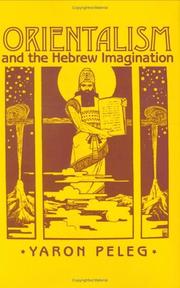| Listing 1 - 10 of 16 | << page >> |
Sort by
|

ISBN: 1501729357 9781501729355 0801443768 9780801443763 Year: 2018 Publisher: Ithaca, NY : Cornell University Press,
Abstract | Keywords | Export | Availability | Bookmark
 Loading...
Loading...Choose an application
- Reference Manager
- EndNote
- RefWorks (Direct export to RefWorks)
Calling into question prevailing notions about Orientalism, Yaron Peleg shows how the paradoxical mixture of exoticism and familiarity with which Jews related to Palestine at the beginning of the twentieth century shaped the legacy of Zionism. In Peleg's view, the tension between romancing the East and colonizing it inspired a revolutionary reform that radically changed Jewish thought during the Hebrew Revival that took place between 1900 and 1930.Orientalism and the Hebrew Imagination introduces a fresh voice to the contentious debate over the concept of Orientalism. Zionism has often been labeled a Western colonial movement that sought to displace and silence Palestinian Arabs. Based on his readings of key texts, Peleg asserts that early Zionists were inspired by Palestinian Arab culture, which in turn helped mold modern Jewish gender, identity, and culture.Peleg begins with the new ways in which the lands of the Bible are formulated as a modern "Orient" in David Frishman's Bamidbar. He continues by showing how in The Sons of Arabia, Moshe Smilansky laid the basis for the literary construction of the "New Jew," modeled after Palestinian Arabs. Peleg concludes with a discussion of L. A. Arielli's 1913 play Allah Karim! in which both the promise and the problems of the Land of Israel as "Orient" marked the end of Hebrew Orientalism as a viable cultural option.
Zionism. --- Jewish-Arab relations in literature. --- Orientalism in literature. --- Hebrew literature, Modern --- Jews --- Zionist movement --- Jewish nationalism --- History and criticism. --- Zionism --- Politics and government --- Restoration --- Arieli, L. A., --- Smilansky, Moshe, --- Frischmann, David,
Book
ISBN: 9780292794269 Year: 2021 Publisher: Austin
Abstract | Keywords | Export | Availability | Bookmark
 Loading...
Loading...Choose an application
- Reference Manager
- EndNote
- RefWorks (Direct export to RefWorks)
Book
ISBN: 9781477309520 Year: 2021 Publisher: Austin
Abstract | Keywords | Export | Availability | Bookmark
 Loading...
Loading...Choose an application
- Reference Manager
- EndNote
- RefWorks (Direct export to RefWorks)
Digital
ISBN: 9780292794269 Year: 2021 Publisher: Austin, Tex. University of Texas Press
Abstract | Keywords | Export | Availability | Bookmark
 Loading...
Loading...Choose an application
- Reference Manager
- EndNote
- RefWorks (Direct export to RefWorks)
Multi
ISBN: 9781477309520 Year: 2021 Publisher: Austin, Tex. University of Texas Press
Abstract | Keywords | Export | Availability | Bookmark
 Loading...
Loading...Choose an application
- Reference Manager
- EndNote
- RefWorks (Direct export to RefWorks)
Multi
ISBN: 9781501729355 Year: 2018 Publisher: Ithaca, N.Y. Cornell University Press
Abstract | Keywords | Export | Availability | Bookmark
 Loading...
Loading...Choose an application
- Reference Manager
- EndNote
- RefWorks (Direct export to RefWorks)
Book
ISBN: 1477309500 1477309527 Year: 2016 Publisher: University of Texas Press
Abstract | Keywords | Export | Availability | Bookmark
 Loading...
Loading...Choose an application
- Reference Manager
- EndNote
- RefWorks (Direct export to RefWorks)
Book
ISBN: 0292718772 0292794266 Year: 2008 Publisher: University of Texas Press
Abstract | Keywords | Export | Availability | Bookmark
 Loading...
Loading...Choose an application
- Reference Manager
- EndNote
- RefWorks (Direct export to RefWorks)
Over the past two decades, profound changes in Israel opened its society to powerful outside forces and the dominance of global capitalism. As a result, the centrality of Zionism as an organizing ideology waned, prompting expressions of anxiety in Israel about the coming of a post-Zionist age. The fears about the end of Zionism were quelled, however, by the Palestinian uprising in 2000, which spurred at least a partial return to more traditional perceptions of homeland. Looking at Israeli literature of the late twentieth century, Yaron Peleg shows how a young, urban class of Israelis felt alienated from the Zionist values of their forebears, and how they adopted a form of escapist romanticism as a defiant response that replaced traditional nationalism. One of the first books in English to identify the end of the post-Zionist era through inspired readings of Hebrew literature and popular media, Israeli Culture between the Two Intifadas examines Israel's ambivalent relationship with Jewish nationalism at the end of the twentieth century.
Love in literature. --- Israeli fiction --- History and criticism. --- Keret, Etgar, --- Taub, Gadi --- Weil, Uzi --- Amir, Gafna, --- Criticism and interpretation. --- Israel --- Intellectual life --- Amir, Gafnah, --- Amir, Gafi, --- אמיר, גפי --- אמיר, גפי, --- אמיר, גפנה --- אמיר, גפנה, --- Ṿail, ʻUzi --- Weill, Uzi --- וייל, עוזי --- ויל, עוזי --- Kerrett, Etgar, --- Керет, Этгар, --- קרת, אתגר --- קרת, אתגר, --- كيريت، إتغار، --- Dawlat Isrāʼīl --- Država Izrael --- Dzi︠a︡rz︠h︡ava Izrailʹ --- Gosudarstvo Izrailʹ --- I-se-lieh --- Israele --- Isrāʼīl --- Isŭrael --- Isuraeru --- Izrael --- Izrailʹ --- Medinat Israel --- Medinat Yiśraʼel --- Stát Izrael --- State of Israel --- Yiselie --- Yiśraʼel --- Ισραήλ --- Израиль --- Государство Израиль --- Дзяржава Ізраіль --- Ізраіль --- מדינת ישראל --- ישראל --- إسرائيل --- دولة إسرائيل --- イスラエル --- 以色列 --- Palestine
Book
ISBN: 9780292725607 Year: 2011 Publisher: Austin, Tex. University of Texas Press
Abstract | Keywords | Export | Availability | Bookmark
 Loading...
Loading...Choose an application
- Reference Manager
- EndNote
- RefWorks (Direct export to RefWorks)
Book
ISBN: 029273560X Year: 2011 Publisher: Austin : University of Texas Press,
Abstract | Keywords | Export | Availability | Bookmark
 Loading...
Loading...Choose an application
- Reference Manager
- EndNote
- RefWorks (Direct export to RefWorks)
Identity (Psychology) in motion pictures. --- Motion pictures
| Listing 1 - 10 of 16 | << page >> |
Sort by
|

 Search
Search Feedback
Feedback About UniCat
About UniCat  Help
Help News
News